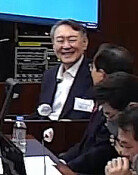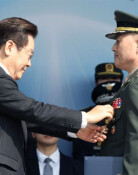Japan Perplexed at Koreas Exceptionally Hard-Line Stance
Japan Perplexed at Koreas Exceptionally Hard-Line Stance
Posted March. 17, 2005 22:46,
The Korean government on March 17 strongly condemned the Japanese claim to Dokdo as a justification for Japans past exploitation over Korea rather than a mere territorial dispute over the islets.
The government formulated the Four Pillars and Five Strategies in its Future Policies plan toward Japan in the Standing Committee of the National Security Council, and asserted in a statement released by Chung Dong-young, chairman of the NSC Standing Committee and Minister of Unification, The Japanese government is claiming territorial dominion over our territory which, during Japanese colonial rule, had been forcibly incorporated into Japanese territory, but which was recovered after our liberation.
We will make every effort to present our noble cause and legitimacy to the international community, he reiterated, officially declaring a scrapping of the existing quiet diplomacy principle.
The government said in its statement that it would take aggressive action to firmly secure Koreas territorial dominion of Dokdo. Japans recent moves are raising fundamental doubts over whether Japan is willing to coexist with its neighbors as a peaceful power in Northeast Asia.
The government suggested establishing Korea-Japan relations based on universal values and common sense, resolutely dealing with Dokdo and history issues, actively putting efforts into publicizing Koreas cause and legitimacy, and continuing political, diplomatic, economic, social, cultural and human exchanges as the four pillars of future relations between Korea and Japan.
[Japan] should realize that winning the trust of its neighboring countries is the very first step in being respected as a leader in the international community, said the government. It also emphasized that it will pay keen attention and make appropriate responses to Japans future moves on this issue, making clear that it might oppose the Japanese bid for a permanent UN Security Council seat depending on Japans next steps on this issue.
The government also presented five strategies in its future response such as: securing Koreas territorial dominion of Dokdo, correcting distorted historical facts in new Japanese textbooks, resolving the issue of victims under Japanese colonial rule for promoting universal human rights, and continuing exchanges and cooperation efforts between the two countries.
When it comes to compensation for victims under Japanese colonial rule, the government asserted that, under the 1965 ROK-Japan Agreement, it would take full responsibility of its own in dealing with this issue. For individuals who had suffered from issues that were not discussed in the 1965 agreement, we will urge the Japanese government to make compensation for them under the principles of respect for human rights and universal humanitarian values, said the government.
In connection with this issue, Vice Minister of Foreign Affairs and Trade Lee Tae-sik reiterated that the Korean government would persuade Japan to compensate Korean comfort women, residents in Sakhalin and A-bomb victims, whose claims were not included in the normalization treaty.
Jong-Koo Yoon jkmas@donga.com taewon_ha@donga.com



![지하철 타고 가는 북한산성…외국인도 반한 ‘K등산 맛집’[전승훈 기자의 아트로드]](https://dimg.donga.com/c/138/175/90/1/wps/NEWS/IMAGE/2026/01/10/133120824.1.jpg)


![두쫀쿠가 뭐라고…영하 8도에 아이들 1시간 줄세운 어린이집 [e글e글]](https://dimg.donga.com/c/138/175/90/1/wps/NEWS/IMAGE/2026/01/09/133126969.3.jpg)
